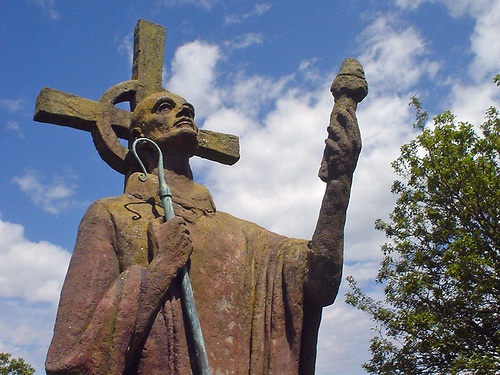Today is the feast of St. Aidan of Lindisfarne, who entered into eternal life in AD 651. He is often called "the Apostle to the English." His statue on the holy island of Lindisfarne shows him bearing a torch, bringing light to a world mired in spiritual darkness, magic, oppression, and anxiety. This shows the Church's task and setting remain essentially the same in every age.
Aidan was sent from that other "holy isle" in the Celtic north (Iona) to try and restart a failed mission led by a previous monk. This monk had spoken down to everyone, was of an irascible temper, and seemed to feel that people needed to come to him rather than he going out to them. He also thought that the Gospel could be propagated by spending his time with the "influencers" and powerful in Northumbria rather than with the ordinary folk. As a way of sharing New Life in Christ, it bombed.
Aidan essentially turned this model upside-down -- which is pretty much what authentic Christianity always does to so-called "normal" strategies of human power and invention.
He spoke humbly and with openness, not cloaking himself in arrogance or "know-it-all-ism." He was gentle in manner yet clearly revealing an inner strength and groundedness in kindness and Truth different from the magicians and wizards. He addressed real problems of poverty and slavery rather than consigning everything to unseen forces and talking in airy platitudes.
He walked everywhere (not using horses, then the symbol of power in transit) and spoke with everyone, high or low. This unnerved some of the high-ups in that very stratified society but it immediately struck the common people and opened doors to Aidan's message his predecessor could never have imagined. The results were spectacular. A form of Christianity -- rooted in the culture and practices of that place and time -- grew rapidly and without coercion. Eventually, an entire crop of holy people were produced in the next generation, which is always a sign God's blessing.
Aidan wasn't concerned with building an institution or a success-machine. In this way he differed from many who claim to follow Christ today, where the focus so often goes to the trappings of success and acknowledged achievement rather than true renewal of the person and the world around us.
Renewal of the Church has never really been the point of Christian mission. The Church is Christ's Body and has already been made glorious in Christ's resurrection and ascension, and through the giving of the Holy Spirit at Pentecost. The Church is forever alive, forever victorious over death, forever new. What isn't is the way the Church often goes about its work.
Much of the last century in our country the Church has acted rather like Aidan's failed predecessor: talking down to those outside, hanging out with elites, and being concerned with symbols of power rather than being like Christ in humility and simplicity. Aidan's witness so many centuries ago is memorable because of how it overturned merely human logic with divine love and unexpected freedom.
What is needed today in the Church is not more relevance and techniques (read: success and control) but more servanthood, listening, and sharing from the treasury not of political/cultural power by ancient and ever-new wisdom -- the wisdom of God. This will, of course, sometimes lead to conflict not only with the "powers that be" but also those who are dedicated to ideologies opposed to the Gospel -- especially those which clothe themselves in "church-talk" while actually being predicated on sin. Yet, such a way of living inevitably attracts those who desire what Jesus, rather than Caesar, has to offer. We must simply be patient, focused, and undistracted in our work.
Such are the seeds of authenticity and simplicity Aidan brought to Northumbria well over one thousand years ago, and these are the seeds of renewal we must tend today.
The Collect for St. Aidan of Lindisfarne
O loving God, you called your servant Aidan from the cloister to re-establish the Christian mission in northern England: Grant that we, following his example, may use what you have given us for the relief of human need, and may persevere in commending the saving Gospel of our Redeemer Jesus Christ; who lives and reigns with you and the Holy Spirit, one God, for ever and ever. Amen.


